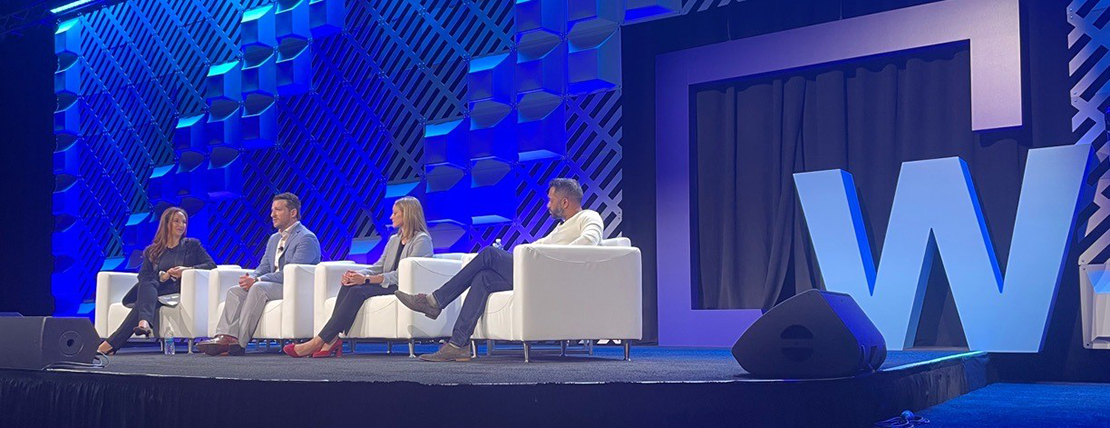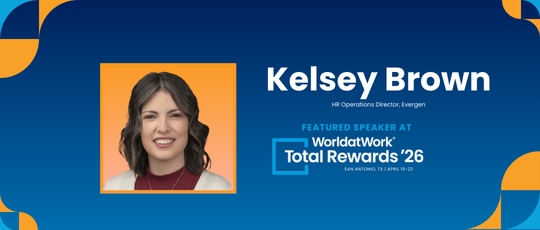- Gather, hypothesize, test and tinker. Panelists at Tuesday’s opening session of WorldatWork’s Total Rewards’23 event pointed to data as the linchpin to informing a personalized approach to employee benefits and well-being offerings.
- Diversified needs drive inclusive solutions. From Audible’s set of physical, mental and financial well-being principles to Hilton’s organizationwide “Courageous Conversations” that encourage belonging, data can help fuel a total rewards strategy based on broader employee needs and culture strengths.
- Remote work and RTO. Organizations are still navigating remote work and return-to-work policies, but total rewards leaders are benefiting from survey data that uncovers themes of importance to employees, which can help further shape benefits strategy.
Vast workforces will feature a diversified set of needs, which requires total rewards leaders to lean on data to offer benefits that are befitting their entire employee base.
This was one of several key messages the panel of practitioners conveyed to nearly 2,000 attendees in Tuesday’s opening session at WorldatWork’s Total Rewards’23 event in San Diego.
Each panelist offered a unique perspective from the industry their company operates in. Hem Patel, vice president of total rewards at Moderna, for instance, spoke of the workforce challenges the company faced from being thrust into the spotlight during its development of a COVID-19 vaccine during the pandemic. This, of course, required significant work hours and has led to workforce expansion in the past two years, which presented its own set of challenges.
Lora Lawler, senior vice president of total rewards at Hilton Hotels, spoke to the opposite end of the spectrum, as the hospitality industry came to a standstill during the pandemic and is still recovering. Hilton had to navigate the culture challenges stemming from furloughing and laying off a large chunk of its workforce and then needing to bring them back,
Lastly, Shaun Brodsky, head of total rewards at Audible, sat somewhere in between the two spectrums, as Audible’s parent company, Amazon, saw rapid growth during the pandemic.
Well-Being and Benefits
The panel, which was led by Kim Lear, a researcher and founder of Inlay Insights, responded to Lear’s research findings about what complications various generations and demographics are facing in the modern workforce and how organizations are addressing those issues.
Each panelist spoke passionately about how achieving personalized rewards and investing in employee well-being has to be embedded in the culture.
Patel emphasized that Moderna is upfront about its work culture, which is performance driven and requires long hours. However, the company has built out robust benefits and well-being programs to support employees and their families in response to this, he said.
Moderna recognizes lifestyle spending accounts as a key benefit they provide to their employees. These accounts, Patel said, offer flexibility and freedom for employees and their families to allocate funds toward various personal expenses that align with their lifestyles.
Patel also said Moderna introduced a new mental health benefit in October 2022 that provides employees and each member of their family up to 26 therapist sessions per year, in addition to other well-being tools.
Lawler said that Hilton implemented a organizationwide series called “Courageous Conversations” as part of its well-being and belonging push. Executives from different areas of the company join these discussions and share personal stories about their struggles navigating such topics as race, mental health and well-being. These conversations help facilitate a culture of belonging, Lawler said.
She also noted that the organization has a set of principles from which it builds its total rewards philosophy. It includes such questions as:
- Am I welcome here?
- Am I healthy?
- Can I grow here?
- Am I part of something bigger than my job?
“Ensuring we have have built a culture where employees can answer yes to these questions is a driving force for us,” she said.
Brodsky said Audible leans on some of these same principles and addresses how its employees “move” by providing yoga and fitness benefits, how they “fuel” by providing subsidized food and drink options onsite as well as a nutritionist, and how they “thrive” by providing physical, mental and financial well-being offerings.
“We listen to our employees and gather data from them to help inform our total rewards stategy,” Brodsky said.
Remote Work
The topic of remote work is of keen interest at the conference, as many larger organizations have asked employees to return to the office or announced plans to do so.
Lear noted a research example of a recent college graduate who had spent the previous two years finishing school and an internship online, developing an optimized routine in the process. When he began his first in-office job, he found the workday was wholly suboptimal and decided shortly after to quit.
The message: People are creatures of habit and deeply ingrained habits were formed during the previous couple years from remote work. Thus, if you’re bringing employees back to the office, your workplace must be optimized for them to continue to thrive.
The panel of practitioners offered similar insights around in-office work based on unique circumstances. Moderna, Patel said, remained in-person throughout the pandemic out of necessity and is upfront about its expectations of needing to be in person to collaborate and foster innovation.
Lawler said that while Hilton’s hotels were shut down during the early stages of the pandemic, its corporate offices remained open and accessible by employees. Thus, it never had to have a formalized return-to-office strategy. However, Lawler acknowledged that the company is committed to building an office culture where employees want to go to work.
“We provide incentives and subsidies for food and drinks to create an appealing environment that encourages employees to come into the office,” Lawler said. “We emphasize the importance of freedom of choice, ensuring that people genuinely want to be present in the office, shifting the mindset from viewing it as a mandate to perceiving it as an opportunity.”
Brodsky echoed Lawler’s sentiment and acknowledged Amazon’s public stance on requiring workers to return to the office. He said Audible utilized surveys from employees and managers that were quantitative and qualitative and tried to extract themes about their views on working in office or remotely.
A key theme Brodsky and his team found for being in the office was the desire to collaborate with team members, which has informed their in-office strategy.
Ultimately, Brodsky left the audience with salient advice to close the session: Gather data, hypothesize, test and tinker when building out personalized benefits and well-being programs.
“Don’t be scared to break things,” Lawler added. “There is no innovation without exploration.”
Editor’s Note: Additional Content
For more information and resources related to this article see the pages below, which offer quick access to all WorldatWork content on these topics:








